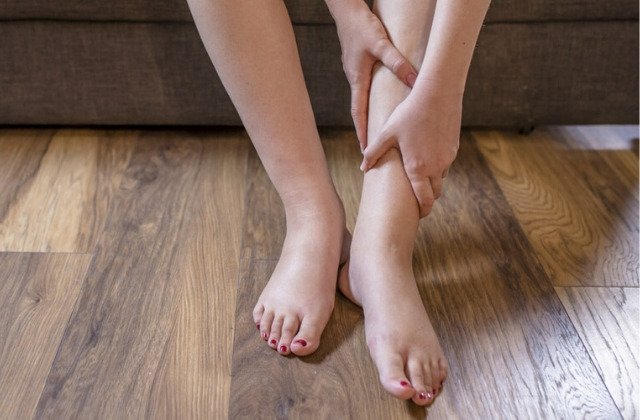During pregnancy, women go through many physical changes and might wait to just get done with it so get back to a normal lifestyle. Most women think that once pregnancy is done, everything will fall into place but that’s not true there are problems even after childbirth, one of them being postpartum swelling or edema.
In this article:
What is Postpartum Swelling?
Is it Normal?
Signs of Postpartum Swelling
Causes of Postpartum Swelling
Treatment for Postpartum Swelling
Natural Remedies for Postpartum Swelling
How Long Does it Last?
What Do Swollen Feet After a C-Section Mean?
When to See a Doctor?
All You Need to Know About Postpartum Swelling
What is Postpartum Swelling?
Postpartum swelling is a condition that women go through right after pregnancy and cause swelling of face, ankles, and belly which can also spread to the hands and legs. The swelling can sometimes be painful making the unpleasant situation.
Is it Normal?
Yes, it is normal for any woman after pregnancy to go under postpartum swelling.
Signs of Postpartum Swelling
Signs and symptoms of postpartum swelling are-
- Swollen hands and feet
- Weight gain
- Swollen ankles
- Puffy skin
Causes of Postpartum Swelling
The causes of postpartum swelling are –
- Hormones – progesterone is a hormone that is produced in a large quantity during pregnancy and can cause the body to retain sodium and water which leads to swelling.
- IV fluids – these are used during labor to prevent dehydration. However, it can also lead to inflammation which is likely to happen after a c-section birth.
- Hypoproteinemia and anemia – hypoproteinemia is a condition characterized by lower-than-normal levels of protein in the body. When there is a deficiency of red blood cells in the body it is anemia. If a mother contracts any or both of these ailments after delivery can suffer from postpartum swelling.
- Hypertension – medical conditions like chronic hypertension and pregnancy-induced hypertension as well as hypothyroid renal disorders can be a cause of postpartum swelling.
Treatment for Postpartum Swelling
Postpartum swelling is common and usually does not need any special treatment. There are simple treatments that can be done at home and can reduce swelling and pain. However, if the situation gets worse, consult a doctor since it could be a sign of other health complications.
Natural Remedies for Postpartum Swelling
Some natural remedies for swollen feet after pregnancy are –
- Massage – get a soothing massage as this improves blood flow and eventually soothes pain.
- Exercise – doing exercise is a great way to get back the pre-pregnancy shape and also reduce swelling.
- Drink lots of water – water helps to flush out excess fluids from the body thus reducing swelling in the body.
- Eat fruits – fruits have anti-inflammatory properties, so eating a lot of them will help to increase metabolism and speed up healing.
- Eat protein-rich foods – low protein diet is the reason for swelling, so it is beneficial to start adding high protein foods in the diet.
- Keep processed and fast foods away – avoid processed and fast foods as they have high levels of sodium which leads to the retention of fluids in the body.
- Elevate the feet and hands – elevate the hands and feet regularly to improve blood circulation. This will eventually reduce the swelling.
- Avoid being in a stationary position – body movement matters a lot when it comes to blood circulation so sitting and standing in the right way and for the right amount of time helps to reduce swelling and better the blood flow.
- Rest well – avoid exerting the body if swollen and experiencing pain so rest it out if things get too much.
- Soak the feet – soaking the feet in warm water with sea salt or bath salts can help soothe the pain and reduce swelling.
- Do yoga in the morning – yoga is yet another stress and pain reliever and helps in better circulation of the blood leading to less swelling in the body.
- Herbal teas – coffee and other caffeinated products can increase dehydration which makes the body retain more fluids. This will delay the recovery from postpartum swelling. Instead, replace these beverages with herbal teas like dandelion tea to prevent swelling.
- Reflexology –this soothes aching muscles and helps in swelling and pain of the feet.
- Cabbage leaves – placing these on the swollen areas helps to reduce pain and discomfort as it draws out extra fluids from the body.
- Reduce the intake of salt – excessive intake of salt can lead to water retention and swelling in the body.
- Avoid tight clothes – allow the body to breathe by wearing loose and comfortable clothes.
- Wear socks for support and comfortable shoes
How Long Does it Last?
After pregnancy, if there is swelling in the arms, feet and other parts of the body, don’t panic as it will go away on its own. At most, it might take a couple of weeks. Swelling or edema happens in most women because of fluids that remain in the body after childbirth.
What Do Swollen Feet After a C-Section Mean?
After a c-section delivery, there are increased chances of developing swelling in the legs. In such cases, use an ice compressor or take a shower in warm water to reduce the pain. Avoid bath lotions if stitches haven’t fully healed.
When to See a Doctor?
Postpartum swelling is not a disease or sickness to be worried about and usually goes down in a week’s time. However, the following cases may need to seek medical help –
- If it lasts for several weeks
- Unbearable pain
- Breathing problems
Conclusion
Postpartum swelling is a common condition that many women undergo after pregnancy but can be prevented easily by home remedies. If other complications are seen consult the doctor.
References
- https://aeroflowbreastpumps.com/blog/what-is-postpartum-edema
- https://www.ncbi.nlm.nih.gov/pubmed/29588233













